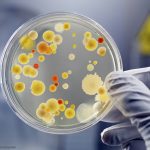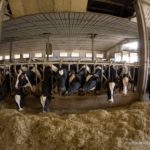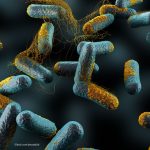New research conducted at North Carolina State University reveals that two of the most common strains of Campylobacter are exchanging genetic material. That means they are producing more infectious and antibiotic-resistant strains. And that is bad news for consumers, since those strains are common in the poultry industry. In 2014, Consumer Reports conducted research on chicken breasts that they purchased in ordinary grocery stores. They found that potentially harmful bacteria, including Campylobacter and Salmonella, was present in almost all of the chicken, including organic brands. In fact, Campylobacter was found on 43% of the samples. Lead author on the study, Maj. Dawn Hull, Army veterinarian and current Ph.D. student at NC State, said in a statement, "There are two strains … [Read more...]
Bird Droppings Carry Antibiotic Resistant Bacteria, Cause Food Poisoning
Whenever there is a food poisoning outbreak linked to produce, we have told you that one source of the pathogen may be bird droppings. A new study conducted at Rice University and published in Elsevier journal Environmental Pollution states that bird droppings carry antibiotic resistant bacteria and may "harbor abundant" numbers of the pathogen along with resistance genes. The study was conducted by environmental engineers and led by postdoctoral research associate Pingfeng Yu of Rice's Brown School of Engineering and co-author Pedro Alvarez. Earlier studies showed that bird-borne antibiotic resistant genes (ARGs) and bacteria can be transferred to humans through these vectors: swimming, contact with bird feces or contaminated soil, and inhaling aerosolized fecal … [Read more...]
Princeton Develops Poison Arrow Against Antibiotic-Resistant Bacteria
A team of researchers at Princeton. have developed an antibiotic that can act as a poison arrow against antibiotic-resistant bacteria. Part of the antibiotic actually punctures the bacterial wall and destroys folate within the cell. This antibiotic is also immune to antibiotic resistance. The combination. of the poisonous compound, SCH-79797, together with the antibiotic's ability to puncture the cells, makes a drug that is stronger than the sum of its parts. The research was published in the journal Cell. Bacteira are either gram-negative or gram-positive. This makes a difference when treating bacterial infections because gram-negative bacteria, such as E. coli O157:H7, have an extra layer of protein around them that resists most antibiotics. No new classes of gram-negative … [Read more...]
Researchers Find Drug Combination Fights Salmonella Infections
Researchers at McMaster University in Ontario have found that a drug combination fights antibiotic resistant Salmonella infections. A combination of the antibiotic and a natural product called dephostatin combined are effective. Colistin is considered a last-resort antibiotic, because it has a toxic effect on the body. When paired with dephostatin, doctors can use much lower concentrations. of colistin as a treatment for Salmonella infections in mice. The results of the study were published in Cell Chemical Biology. Caressa Tsai, first author and a PhD student in biochemistry and biomedical sciences at the Coombes lab at McMaster said in a statement, "The rise of antibiotic resistance has ushered in the post-antibiotic age, and alternatives to antibiotics are urgently required. … [Read more...]
Factory Farming Increases the Risk of Pandemic Development
A study conducted at the University of Bath has found that factory farming increases the risk of pandemic development. Overuse of antibiotics, low genetic diversity, and a large number of animals increases the risk of animal pathogens transferring to humans. Viruses and bacteria that jump from animals to humans are called zoonotic diseases. Some zoonotic diseases include bird flu, Campylobacter, Salmonella, E. coli infections, swine flu, and novel coronavirus. Scientists investigated the evolution of Campylobacter jejuni, a bacteria that is carried by cattle. This pathogen causes is transferred to people who eat contaminated meat and poultry. It causes bloody diarrhea and cause serious illness in those with compromised immune systems and chronic illnesses. About 1 in 7 people … [Read more...]
New Data Shows Rising Antibiotic Resistance Among Foodborne Pathogens
Bad news about antibiotic resistance and food poisoning: New surveillance data from European Union member states shows rising antibiotic resistance to a medically important antibiotic among foodborne pathogens. The report focuses on antibiotic resistance levels in Salmonella, Campylobacter, E. coli, and methicillin-resistant Staphylococcus aureus (MRSA). The bacteria that were analyzed were taken from humans, pigs, calves, broiler chickens, and turkey. Resistance to the critically important antibiotic ciprofloxacin is common in some species of Salmonella taken from patient isolates. Resistance to ciprofloxacin ranged from high to very high in Campylobacter recovered from people, food producing animals, and poultry. This resistance makes infections much more difficult to treat. In … [Read more...]
New Study Finds Indoor Dust Bacteria Can Be Antibiotic Resistant
Did you know that dust in your house may be housing antibiotic resistant bacteria? A study conducted at Northwestern University has shown that indoor dust bacteria have transferable antibiotic resistance genes. That means the bacteria living in household dust can spread antibiotic resistant genes to other bacteria. Most of these bacteria are not harmful to people, but researchers think these genes could spread to pathogens such as E. coli of Salmonella. Antibiotic resistance in these bacteria can make human infections more difficult to treat. Erica Hartmann, an assistant professor of environmental engineering in Northwestern's McCormick School of Engineering, who led the study, said in a statement, "This evidence, in and of itself, doesn’t mean that antibiotic resistance is … [Read more...]
Antibiotic-Free or Organic Poultry Less Likely to Have MultiDrug-Resistant Bacteria
A study conducted at the Pennsylvania Department of Health, along with the Penn State College of Medicine and the FDA, found that meat from conventionally-raised poultry harbored almost twice as much multidrug-resistant Salmonella bacteria as meat from antibiotic-free or organic poultry. The study was presented at IDWeek 2019. Consuming Salmonella-contaminated meat is one of the most common causes of foodborne illness. Since this infection is treated with antibiotics, when the pathogen is resistant to many different commonly used drugs, the illness can be more serious and dangerous. The overuse and misuse of antibiotics in both humans and animals raised for food leads to antibiotic resistance. The FDA has issued guidance documents, which are not legally binding, to try to limit … [Read more...]
New Study Shows Neighborhood Antibiotic Use Increases Resistance
A new study, published in Israel and published in the Lancet Infectious Diseases journal, found that increased use of antibiotics in certain neighborhoods is associated with an increased risk of acquiring an antibiotic-resistant infection. The scientists looked at fluoroquinolone-resistant E. coli bacteria found in urine cultures of Israelis in more than 1700 neighborhoods. The authors say that this may mean that individual personal consumption of antibiotics isn't the only way that antibiotic resistance is being spread. There may be a selective mechanism for resistance at the community level too. The researchers collected medical records and demographic date on 2.4 million patients, and analyzed almost 5 million urine-culture specimens sent to Clalit Health Services from 2010 … [Read more...]













